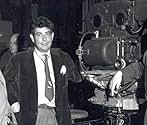Historian/critic/director
Peter Bogdanovich praises Ulmer's directorial work on
low-budget movies like
The Naked Dawn (1955) and
The Cavern (1964), which he considers
"classics", adding that "the astonishing thing is that so many of
Ulmer's movies have a clearly identifiable signature [despite being]
accomplished with so little encouragement and so few means . . . ". Ulmer
worked in set design beginning as a teenager for Austrian director
Max Reinhardt. He came with Reinhardt to the US in 1923 with the play "The
Miracle", which opened on Broadway. He was blackballed from Hollywood
work after he had an affair with Shirley Castle (he eventually married
her and she became known as
Shirley Ulmer), who at the time was the wife of
B-picture producer
Max Alexander, a nephew of powerful Universal Pictures
president
Carl Laemmle. Ulmer spent the bulk of his remaining career languishing at PRC, the lowest rung on the ladder of Hollywood's "Poverty Row" studios. He signed a long-term contract there in October 1943 after directing the "big-budget" (by PRC standards)
Jive Junction (1943), becoming the company's #1 director. Ulmer remains the principal reason PRC is mentioned in Hollywood history at all.












































